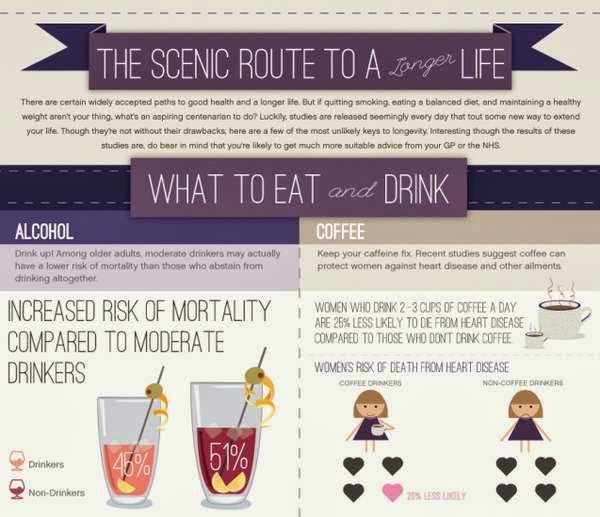Coffee is more than just dark-colored liquid with caffeine… coffee actually contains hundreds of different compounds, some of which have important health benefits. Several massive studies have now shown that the people who drink the most coffee live longer and have a reduced risk of diseases like Alzheimer’s and diabetes.
Coffee is rich in antioxidants
When hot water runs through the coffee grounds while brewing, the substances in the coffee beans mix with the water and become part of the drink. Some of these substances are well known, including caffeine, but there are hundreds of other compounds in there as well, many of which science has yet to identify. Many of these compounds are antioxidants that protect our bodies from oxidation, which involves free radicals that damage molecules in the body. Oxidation is believed to be one of the mechanisms behind ageing and common diseases like cancer and heart disease. The very good news is that coffee happens to be the biggest source of antioxidants in the Western diet, outranking both fruits and vegetables… combined.
Several massive studies show that coffee drinkers live longer
There are several studies showing that when people drink coffee, they have a lower risk of dying from a range of serious diseases. A groundbreaking study, the largest of its kind, was published in the New England Journal of Medicine in 2012. In this study, 402,260 individuals between 50 and 71 years of age were asked about their coffee consumption. The results were fairly remarkable… after following the people for 12-13 years, those who drank the most coffee were significantly less likely to have died.
As you can see from the graph, researchers found a small but significant inverse association between coffee drinking and mortality. In other words: the more coffee people drank, the likelier they were to still be alive when the study ended. When researchers looked at particular causes of death, they found that the coffee drinkers were less likely to die from infections, injuries and accidents, respiratory disease, diabetes, stroke and heart disease. The benefit does not appear to be attributable to the caffeine, because both decaf and regular coffee had the same effect.
Some caveats: those who drank 4-5 cups per day were better off than those who pushed it to 6+, and the finding was only true after the researchers controlled for bad habits like smoking. So, if you take a cigarette with your coffee, any protective effect disappears.
Other studies have lead to similar results
One study in the European Journal of Epidemiology found “quantitative evidence that coffee intake is inversely related to all cause and, probably, [cardiovascular disease] mortality.”
A 2013 analysis of almost a million people came to the same conclusion: “Our findings indicate that coffee consumption is associated with a reduced risk of total mortality.”
More research is underway, and a cause-effect relationship will be difficult to demonstrate. But based on the research we have so far, the time may not be distant when we celebrate coffee as a health food.
Mug-bottoms up!
Sources: http://authoritynutrition.com/, http://www.businessinsider.com.au/, http://www.huffingtonpost.com/, http://well.blogs.nytimes.com/


.jpg)

